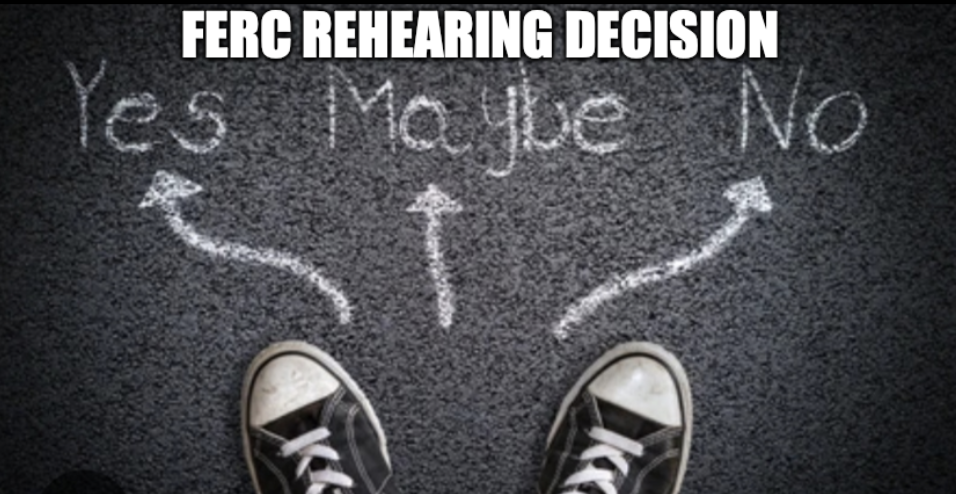When is a denial not a denial? When FERC is trying to skirt around the law, that's when!
Last week, FERC issued a "denial" of the Request for Rehearing filed by landowner groups in Illinois in Docket No. ER24-59.
| 20240429-3022_er24-59-001.docx |
It's trying to get around the law, that's what. A brief history lesson is needed. The law says FERC must make a decision on a Request for Rehearing within 30 days or it is deemed denied "by operation of law." If FERC wants to deny a request, it simply does nothing and it is automatically considered denied after 30 days. FERC does not need to issue an order of denial. It is simply presumed by FERC's lack of action.
But, FERC operates with all the alacrity of a sleepy sloth. It simply can't get its stuff together to act on a request for rehearing within 30 days. FERC action on a Request for Rehearing most often consists of a modified or reversed order. It rarely results in an actual rehearing of the case and the taking of new evidence. When it does, it's usually what's known as a "paper hearing" where everything is done through filings and there is no actual physical hearing. FERC actually has to produce something during that 30-day period, and it rarely gets those things out the door by the deadline.
FERC used to deal with this problem by granting the Request for Rehearing "for further consideration." This meant that FERC had not made a decision on how it wanted to act, but it was preventing the Request from being denied by operation of law. FERC would eventually issue a new order, but it would be well past the 30 days allowed for reconsideration under the law. In fact, FERC began to use this scheme as a tool to trap parties in an endless purgatory of having their request granted but not acted upon. By doing this, FERC was preventing the losing party from appealing its order while they waited for the rehearing order. Sometimes, this took many years, sometimes never, and the matter sat at FERC forever but couldn't be appealed.
That all came crashing down in 2020, when the D.C. Circuit Court of Appeals issued an order on a case known as Allegheny Def. Project v. FERC. The Court said that FERC could no longer prevent appeal by granting rehearing for further consideration. It had to act within 30 days or the request was denied and the losing party could appeal FERC's order in court. Of course, this set up an impossibility at FERC, who couldn't pump out its rehearing orders within the 30 days allowed by law. FERC came up with a new scheme technically within the law, but producing absurd results in practice.
FERC's new procedure allows it several months to act (no longer unlimited) but it also sets up appeals that may never proceed. FERC must deny a rehearing that it has not acted upon within 30 days, but the law allows FERC to change its mind and modify or set aside its original order before the case record is filed at the appeals court. FERC buys itself time, but that time extends past the deadline for a party to appeal. A party has 60 days to appeal a FERC order once request for rehearing is denied. But FERC has 40 days after the appeal is filed to file the record with the court. This way FERC can buy itself an additional 100 days to act on the request for rehearing, even when it has been denied "by operation of law." If FERC has not issued a new order within 60 days, an appeal must be filed. An appeal requires a $500 filing fee and several documents to be filed and served. It's not cheap or easy. The appellant is forced to file an appeal of an order it has not yet seen. If FERC acts after the appeal is filed and before the record is filed, it may change the grounds for appeal. If the appellant then withdraws its appeal, it's not getting its time and money back. It's an procedure that is unfair to appellants and causes everyone a bunch of unnecessary work and expense.
That's what FERC has chosen to do in this case, where it approved Grain Belt's request for negotiated rate authority, then denied the landowners' request for rehearing by operation of law but intends to issue a future order before the record is filed.
The landowners may have no choice but to proceed with appeal while they wait for FERC to quit dithering and issue an order. FERC's future order could modify or set aside its original order. If FERC subsequently decides to change its mind on this matter, then maybe it's Grain Belt who would want to request rehearing and appeal the new order. The only certainty here is uncertainty. FERC has stated its intention to act on the Request for Rehearing, but nobody knows how that will change the outcome.
Stay tuned... when FERC finally issues its new order within 100 days, things could change significantly.
When is a denial not a denial? When FERC is trying to skirt the law!

 RSS Feed
RSS Feed